
The Eastern Orthodox Church, officially the Orthodox Catholic Church, and also called the Greek Orthodox Church or simply the Orthodox Church, is the second-largest Christian church, with approximately 230 million baptised members. It operates as a communion of autocephalous churches, each governed by its bishops via local synods. The church has no central doctrinal or governmental authority analogous to the pope of the Roman Catholic Church. Nevertheless, the Ecumenical Patriarch of Constantinople is recognised by them as primus inter pares, a title formerly given to the patriarch of Rome. As one of the oldest surviving religious institutions in the world, the Eastern Orthodox Church has played an especially prominent role in the history and culture of Eastern and Southeastern Europe.

Ecumenism – also called interdenominationalism, or ecumenicalism – is the concept and principle that Christians who belong to different Christian denominations should work together to develop closer relationships among their churches and promote Christian unity. The adjective ecumenical is thus applied to any non-denominational or inter-denominational initiative which encourages greater cooperation and union among Christian denominations and churches. Ecumenical dialogue is a central feature of contemporary ecumenism.
The Baptist Union of Denmark is a Baptist Christian denomination in Denmark. It is a member of the European Baptist Federation, the Baptist World Alliance, and the World Council of Churches. Headquarters of the Union are maintained in Copenhagen.

The British and Foreign Bible Society, often known in England and Wales as simply the Bible Society, is a non-denominational Christian Bible society with charity status whose purpose is to make the Bible available throughout the world.
Religion in the United Kingdom is mainly expressed in Christianity, which dominated the land since the 7th century. Results of the 2021 Census for England and Wales showed that Christianity is the largest religion, followed by the non-religious, Islam, Hinduism, Sikhism, Judaism, Buddhism, and Taoism. Among Christians, Anglicanism is the most common denomination, followed by Catholicism, Presbyterianism, Methodism, Unitarianism, and Baptism. Results for the 2022 census in Scotland showed that 38.8% of the Scottish population identified as Christian, with 20.4% stating that the Church of Scotland is their main religion, whilst 13.3% stated their main religion was the catholic church in Scotland.
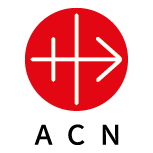
Aid to the Church in Need is an international Catholic pastoral aid organization, which yearly offers financial support to more than 5,000 projects worldwide.

Gabriel of Komana was an Eastern Orthodox archbishop of the Ecumenical Patriarchate who led the Patriarchal Exarchate for Orthodox Parishes of Russian Tradition in Western Europe from 2003 to 2013.

Action of Churches Together in Scotland (ACTS) was a national ecumenical organisation of churches in Scotland, founded in 1990. It ran until 2022.
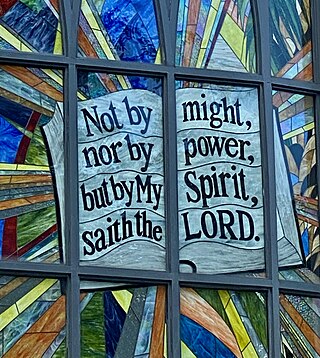
Christians in Singapore constitute 19% of the country's resident population, as of the most recent census conducted in 2020. Christianity is the second largest religion in the country, after Buddhism and before Islam. In 2020, about 37.1% of the country's Christians identified as Catholic with 62.9% labeled as 'Other Christians', most of which identify as Protestant, with some identifying as Orthodox or other minority Christian denominations.

The Catholic Church in Ukraine is part of the worldwide Catholic Church, under the spiritual leadership of the Pope in Rome. Catholics make up 10% of the population of Ukraine.
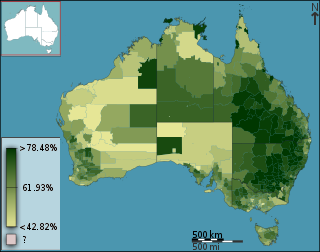
Christianity is the largest religion in Australia, with a total of 43.9% of the nation-wide population identifying with a Christian denomination in the 2021 census. The first presence of Christianity in Australia began with British colonisation in what came to be known as New South Wales in 1788.

The Catholic Church in North Macedonia is part of the worldwide Catholic Church, under the spiritual leadership of the Pope in Rome and is one of the major religious communities that exist on the territory of the Republic of North Macedonia. Catholic believers from North Macedonia mostly include Albanians, Macedonians and Croats and are most concentrated in the Skopje Statistical Region and the Southeastern Statistical Region of North Macedonia.
London has centres of worship for many faiths. According to the 2021 Census, the largest religions are Christianity (40.66%), followed by Atheism (27.05%), Islam (14.99%), no response (7%), Hinduism (5.15%), Judaism (1.65%), Sikhism (1.64%), Buddhism (1.0%), and others (0.9%). Compared to the previous census, the most noticeable changes are that Christianity decreased whereas Atheism increased.
Student Christian Movement of Great Britain is a British religious charity led by students, past and present. The movement is an ecumenical and inclusive community that recognises unity in diversity and explores faith through worship, discussion and action. SCM's vision is that "every student can find a vibrant, open and inclusive Christian community, where they can explore faith and be inspired to put faith into action."
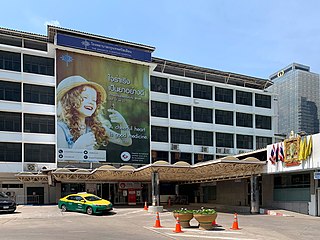
It was believed by some scholars that Christianity was first introduced to Thailand by European missionaries. By 2021, there were nearly 1 million Christians in Thailand and represented 1.4% of the predominantly Buddhist national population. Christians are numerically and organizationally concentrated in northern Thailand, where they make up an estimated 16% of the population in some lowland districts and up to very high percentages in tribal districts.
Ignatius Anthony Catanello was an American prelate of the Roman Catholic Church. From 1994 to 2010 he served as an auxiliary bishop of the Diocese of Brooklyn.
Operation Noah is an ecumenical Christian charity, based in the UK, that campaigns exclusively on climate change. Trustees are cross-denominational, with members from the Catholic, Anglican and free churches. The charity is managed by the Chair and Board, with a small number of support staff. It is funded through supporter donations and grants.
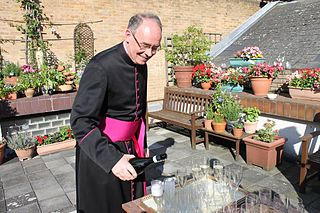
Mark Anthony Edmund Langham was a Catholic priest who served in parishes in his native London, in the Vatican as an official working on inter-church relations and latterly as Catholic chaplain to the University of Cambridge at Fisher House.

Saint John the Baptist Catholic Church is a parish of the Roman Catholic Church in Silver Spring, Maryland, United States. It was established by the Archdiocese of Washington in 1960, and is dedicated to John the Baptist.

Timothy Christopher Verdon, is a Roman Catholic priest and art historian, specialized in Christian Sacred Art on which he has written numerous books and articles. He has organized international scholarly conferences and curated exhibitions in Italy and the USA. He was born and raised in Hudson County, New Jersey, United States, and has lived in Italy for more than 50 years, now residing in Florence.














